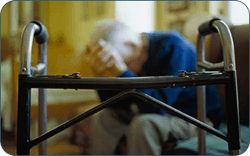 Dementia is the name for a group of illnesses that affect the brain. There are several types of dementia of which the most common is Alzheimer’s disease.
Dementia is the name for a group of illnesses that affect the brain. There are several types of dementia of which the most common is Alzheimer’s disease.
The typical early signs of dementia are someone becoming forgetful and confused – forgetting people’s names or how to get home. Later, people are likely to find everyday tasks – such as shopping or cooking – difficult. They may also find social situations hard to manage.
Around 750,000 people in the UK have dementia. The number of people with dementia is expected to double in the next 30 years because more people are living longer.
Care Quality Commission to address dementia care in Care Homes
The Care Quality Commission (CQC) has found that the quality of dementia care in some care homes and hospitals in England is inconsistent, according to its inspection report titled ‘Cracks in the Pathway’. The quality of care for people with dementia is too often ‘unacceptable’ according to the CQC’s chief inspector of adult services, Andrea Sutcliffe. The report is the CQC’s first national investigation into dementia care across England. It recommends appointing training inspectors and a national specialist adviser for dementia care.
One Million people to be trained to spot early signs of Dementia
 The government has recently announced that it wants to train a million people in England by 2015 to become “dementia friends” and to be equipped to spot signs of the illness and help sufferers. It is part of plans to raise awareness of the condition, which affects nearly 700,000 people in England.
The government has recently announced that it wants to train a million people in England by 2015 to become “dementia friends” and to be equipped to spot signs of the illness and help sufferers. It is part of plans to raise awareness of the condition, which affects nearly 700,000 people in England.
The number of people with this condition is expected to double in the next 30 years because more people are living longer. The government is launching the Dementia Friends scheme, which has been adapted from a similar programme in Japan that recruited three million volunteers. Sessions in workplaces and town halls across the country will explain what dementia is, what it is like to have the condition and what people can do to help if they meet someone with the symptoms.
It is hoped that charities, businesses and the wider public will get involved.
“People with the condition should never feel barred from everyday activities like shopping for groceries or spending time with friends.
The chief executive of the Alzheimer’s Society, Jeremy Hughes, said: “We want to rally a million people behind the cause of helping make a better life for people with the condition.
“I am confident we will not only meet this target but beat it. It is everyone’s problem and we all need to be part of the solution.”
For Further reading and useful information please follow the links below:
The Alzheimer’s Society
Alzheimer’s Society is a membership organisation, which works to improve the quality of life of people affected by dementia in England, Wales and Northern Ireland. Many of the 20,000 members have personal experience of dementia, as carers and health professionals, and their experiences help to inform our work.
The Alzheimer’s Society
Dementia UK
We provide mental health nurses specialising in dementia care, called Admiral Nurses. Admiral Nurses are a lifeline to thousands of people in this country. They provide psychological support to help family carers understand and deal with their feelings, practical advice and information on dementia, its impact and how to cope. They can also provide referrals to other appropriate services and liaison with other professionals to provide holistic support when it’s most needed.
Dementia UK
